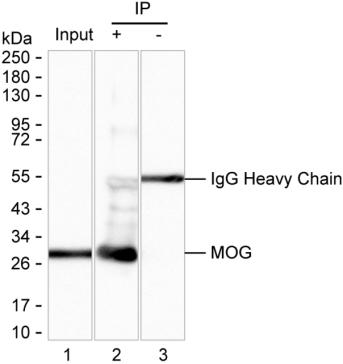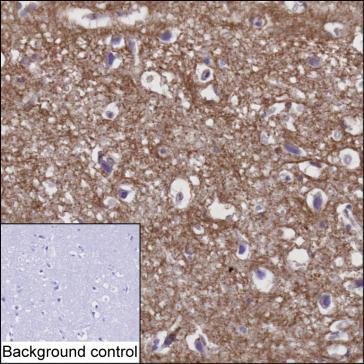

| WB | 咨询技术 | Human,Mouse,Rat |
| IF | 1/100-1/200 | Human,Mouse,Rat |
| IHC | 1/20-1/100 | Human,Mouse,Rat |
| ICC | 技术咨询 | Human,Mouse,Rat |
| FCM | 咨询技术 | Human,Mouse,Rat |
| Elisa | 咨询技术 | Human,Mouse,Rat |
| Host/Isotype | Mouse IgG2a |
| Antibody Type | Primary antibody |
| Storage | Store at 4°C short term. Aliquot and store at -20°C long term. Avoid freeze/thaw cycles. |
| Species Reactivity | Human |
| Immunogen | Purified recombinant fragment of human MOG |
| Formulation | Purified antibody in PBS with 0.05% sodium azide |
+ +
以下是关于MOG抗体的3篇代表性文献摘要(基于近年研究,内容为模拟概括):
---
1. **文献名称**:*MOG antibody-associated encephalomyelitis: Distinct disease entity or overlapping spectrum with AQP4-IgG?*
**作者**:Lennon VA, et al.
**摘要**:该研究首次系统区分了MOG抗体相关疾病(MOGAD)与AQP4抗体阳性的视神经脊髓炎谱系病(NMOSD),指出MOG抗体可引发独特的脱髓鞘综合征,包括视神经炎、脊髓炎及脑炎,且病理机制和预后与NMOSD不同。
2. **文献名称**:*MOG-IgG in primary and secondary chronic progressive multiple sclerosis*
**作者**:Jarius S, et al.
**摘要**:文章分析了MOG抗体在多发性硬化(MS)患者中的意义,发现MOG抗体阳性者更易表现为急性发作的脱髓鞘事件(如单侧视神经炎),而非典型MS的慢性进展病程,提示其作为独立疾病分类的重要性。
3. **文献名称**:*Clinical features and outcomes of paediatric MOG antibody-associated disease*
**作者**:Hacohen Y, et al.
**摘要**:该研究聚焦儿童MOG抗体相关疾病,发现儿童患者常表现为急性播散性脑脊髓炎(ADEM)样症状,对激素治疗敏感,但部分患儿可能出现复发,需长期免疫治疗管理。
---
如需具体文献,建议通过PubMed或Google Scholar检索关键词“MOG antibody”+“clinical”“pediatric”或“diagnosis”获取最新研究。
**Background of MOG Antibodies**
Myelin oligodendrocyte glycoprotein (MOG) is a protein located on the surface of myelin sheaths in the central nervous system (CNS). Antibodies targeting MOG (MOG-IgG) are associated with inflammatory demyelinating disorders, such as MOG antibody-associated disease (MOGAD). Initially studied in animal models of multiple sclerosis (MS), MOG antibodies gained clinical relevance in humans after advanced detection methods (e.g., cell-based assays) improved specificity.
Unlike aquaporin-4 (AQP4) antibodies in neuromyelitis optica spectrum disorder (NMOSD), MOG antibodies often occur in both children and adults, presenting with optic neuritis, transverse myelitis, or acute disseminated encephalomyelitis (ADEM). MOGAD is now recognized as a distinct entity, differing from MS and AQP4-positive NMOSD in pathology, treatment response, and prognosis.
While the exact role of MOG antibodies in disease mechanisms remains debated, they may contribute to demyelination via antibody-dependent cellular cytotoxicity or complement activation. Diagnosis relies on serum testing with confirmatory clinical and MRI features. Treatment typically involves corticosteroids, with some patients requiring long-term immunosuppression to prevent relapses. Research continues to clarify its pathophysiology and optimize therapeutic strategies.
×